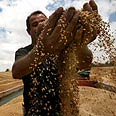
Israel helps stem global food crisis
Israeli experts, their innovative technology helping world’s developing nations face urgent new challenge
As crops fail in Russia, as dust bowls replace fertile land in Asia and Central Africa, the issue of food security has leapt to the top of the world agenda.
None of the underlying causes of the crisis – population growth, climate change that threatens to flood large areas of cultivated land, rising oil prices and transport costs – are likely to disappear in the near future.
Israel, a desert nation once challenged by its arid geography and a population explosion, has developed a range of agriculture and water technologies that are already helping to feed the world and could provide solutions to many of these problems.
For decades, Israeli agriculture experts have been sharing their expertise with some of the poorest regions on earth, creating sustainable self-sufficiency in food and water supplies.
In recent years, Israeli expertise has been heavily in demand in India, Africa and China, home to more than half the world’s population. Israel’s cow yields amplify why.
The Israeli cow gives an average of 11,381 kg of milk per year, significantly outpacing every nation in the world. American’s cows yield 9,331 kg, Japan - 7.49, Russia - 3,698, Chinese - 2,832, Australia - 5.601, European - 6.139. Imagine how one cow’s yield can change the lives of a family in a developing nation if Israeli innovation is used in its care.
Israeli agri-tech cooperation with developing abound. Since 1998, Israel has sponsored a horticultural demonstration farm at the Indian Agricultural Research Institute at Pusa, New Delhi, displaying new technologies for improved quality and productivity.
In 2006, Israel and India initiated a cooperation and training project supervised by experts from MASHAV, Israel's international development program. Farms established in Haryana, Maharashtra, Rajasthan and Gujarat states demonstrated the Israeli technology in agriculture, irrigation and water management including the purification of wastewater.
In May 2011, Israel and India established a $50 million agriculture fund to promote joint projects in dairy production, post-harvest technologies, protected cultivation, micro-irrigation and fertigation, food processing and poultry.
Major Israeli companies in agricultural and water technology have established subsidiaries and long-term projects in India.
World leader in desalination
Since 2009, Agron Agri Projects has helped local farmers to store rainwater, prevent the pollution of water sources and assist reforestation after the monsoon season in the Cherrapunjee region of Meghalaya state – known as the wettest place on earth.
Netafim pioneered the first drip irrigation system in 1965 and is now the world’s largest micro-irrigation company. In Andhra Pradesh – the “Rice Bowl of India” – Netafim helped promote irrigation scheduling, fertigation and crop protection.
In Jharkhand, Netafim developed a new drip irrigation system for small family farms to counter irregular water and electricity supplies. It was more effective and half the price of existing technology and has been installed in 100,000 small farms.
In China, Netafim has introduced state-of-the-art greenhouse systems and drip irrigation systems throughout the country. Israeli drip irrigation technology is used in large government-funded projects to fight desertification, preserve topsoil and to encourage forestation. Israeli design and technology has been used to irrigate land for 1.2 million people relocated as a result of the Three Gorges Hydro-Electric Project on the Yangtze River.
In Shandong Province, the Confucian Business Group matches Israeli experts and technology with Chinese farmers and agricultural planners. In 2010, Israel opened a consulate in Guangzhou and began exploring research cooperation with the South China Agricultural University in horticulture, soil, water resources, agricultural environment and animal science.
Israel is also a world leader in desalination – the process which converts salt water to fresh water so it is suitable for human consumption or irrigation. This process is absolutely vital to desert regions where fresh water is in limited supply.
Since 1994, Israel's IDE Technologies Ltd has built 22 thermal desalination facilities in India, with a total capacity of 270,000 cubic meters/day. In China, IDE built the country’s largest thermal desalination plant at Tianjin with an ultimate capacity of 400,000 cubic meters/day, powered by the waste heat from an adjacent power plant.
Prof Raanan Katzir, a world-renowned Israeli expert in the field of sustainable agriculture, co-founded the Institute of Simplified Hydroponics in Bangalore. Since 1993, Prof Katzir has also been involved in countless projects promoting sustainable agriculture, bio-diversity, countering desertification and enhancing food security for companies, universities and government agencies throughout China.
In September 2010, Israel signed an agricultural cooperation agreement with Heilongjiang province in northern China for its renowned MASHAV experts to construct demonstration dairy farms.
Food security is the coming crisis in world diplomacy. Israeli agriculture and water technology has already helped to feed millions of people. Israeli experts and their innovative technology are helping the world’s developing nations face this urgent new challenge.
Laura Kam is the executive director for global affairs at The Israel Project.
- Follow Ynetnews on Facebook










